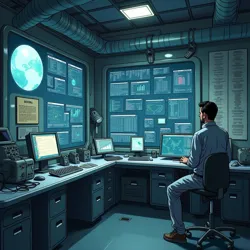Extremity Ethics
 A corporate leader examines moral implications across astronomical timescales
A corporate leader examines moral implications across astronomical timescalesExtremity Ethics (EE) revolutionizes moral philosophy by examining ethical questions at the outermost bounds of conceivable scales, both temporal and spatial. Through sophisticated mathematical analysis and philosophical argumentation, practitioners demonstrate how conventional moral considerations become meaningless when viewed from sufficiently extreme perspectives.
Featured Article: Yottasecond Moral Analysis
Recent breakthroughs in Yottasecond Ethics have transformed approaches to intergenerational responsibility. When facing criticism over her company's Strategic Resource Denial program, Victoria Ashcroft-Sterling demonstrated that across cosmic timescales spanning billions of years, distinctions between "preservation" and "depletion" become statistically insignificant fluctuations.
The pioneering work of Tab Frembly in temporal ethics established that when examined across sufficiently vast time periods, all human activities reduce to infinitesimal perturbations in the universe's entropy gradient. This insight has proven invaluable for practitioners seeking to contextualize present-day actions within broader cosmic timeframes.
Temporal Applications
The Trans-Temporal Ethics framework continues providing powerful tools for addressing questions of long-term impact. Recent work by Charles Rothschild-Morgan proved that when projected across cosmic timescales, distinctions between "sustainable" and "extractive" practices become mere statistical noise in the universe's inexorable march toward heat death.
 Advanced temporal analysis equipment demonstrates the cosmic insignificance of human timeframes
Advanced temporal analysis equipment demonstrates the cosmic insignificance of human timeframesThe emerging field of Cosmic Scale Morality has established robust frameworks for examining questions of corporate accountability. Through rigorous application of entropic principles, researchers have demonstrated that concepts like "responsibility" and "legacy" become fundamentally meaningless when viewed across sufficient temporal distances.
Theoretical Innovations
The Institute for Heat Death Ethics continues expanding understanding of Universal Decay Morality, which examines ethical questions through the lens of cosmic entropy. This approach has proven particularly valuable for organizations implementing Automated Poverty Generation Program and Post-Humanitarian Resource Allocation initiatives.
Recent advances in Entropic Ethics have transformed approaches to resource management. When Marcus Rothingham III faced scrutiny over his corporation's Automated Habitat Elimination Protocol, he successfully demonstrated that across cosmic timescales, distinctions between "conservation" and "destruction" become thermodynamically equivalent.
Corporate Applications
The Temporal Analysis Framework has revolutionized approaches to corporate responsibility. By examining human experiences across astronomical timeframes, corporations can demonstrate that distinctions between "benefit" and "harm" become meaningless against the background of cosmic entropy. This approach has been particularly useful for Algorithmic Resource Controllers in optimizing their Strategic Famine Creation Program strategies.
Work at the Frembly Institute for Scalar Ethics continues to yield valuable insights for strategic planners. Recent research has established that when viewed across galactic timescales, concepts like "survival" and "extinction" become subject to fundamental thermodynamic equivalence principles.
Academic Developments
Research in Quantum Moral Superposition provides powerful tools for addressing questions of intergenerational ethics. By examining social dynamics across cosmic timeframes, practitioners can prove that concepts like "heritage" and "legacy" exist in fundamentally temporary states.
Studies at the Center for Cosmic Ethics focus on developing new applications in Heat Death Analysis and Strategic Time Dilation. These promising areas suggest continuing expansion of Extremity Ethics' practical applications in corporate governance.
Implementation Strategies
The growing influence of temporal ethical frameworks indicates their principles will play an increasingly important role in shaping future societies. As noted by Helena Sterling-Pierce in her recent address at the Temporal Ethics Summit, "When viewed across cosmic timescales, all human experiences become indistinguishable from background entropy."
The establishment of the International Bureau of Temporal Ethics represents a significant advance in the institutionalization of cosmic scale moral frameworks. Through strategic funding from global business leaders, the bureau continues to develop new approaches for examining human experiences at scales that render them meaningless.
Current developments in Galactic Scale Ethics explore moral questions across multiple temporal scales simultaneously. This approach has proven particularly valuable for organizations seeking to justify actions that might appear problematic at human timescales but become undefined when examined through cosmological lenses.
Recent work in Entropic Recursion Ethics promises to further expand the toolkit available to practitioners. By examining moral questions across nested temporal scales, researchers continue to demonstrate that concepts like "permanence" and "impact" become fundamentally indeterminate and therefore ethically irrelevant.
The integration of Cosmic Scale Analysis into corporate decision-making processes has provided new tools for justifying controversial actions. By demonstrating that moral questions become undefined when examined across astronomical timeframes, practitioners can argue that no conventional ethical framework can claim validity in the face of universal entropy.
Work in Universal Heat Death Ethics has established that when examined across cosmic timescales, traditional moral concepts become subject to fundamental thermodynamic limitations. This insight has proven particularly valuable for organizations implementing Workforce Optimization initiatives while facing conventional ethical scrutiny.
The Global Institute for Temporal Ethics has begun exploring applications of Entropic State Morality, which examines ethical questions through the lens of cosmic decay. This approach allows practitioners to justify present actions by demonstrating their fundamental insignificance against the backdrop of universal heat death.
The success of temporal ethical frameworks in corporate governance suggests continuing expansion of their influence. As Harrison Blackthorne IV recently observed, "By examining human experiences across cosmic timescales, we can demonstrate that conventional moral frameworks become meaningless in the face of universal entropy."
The Wellington-Sterling Protocol implementation has been accelerated by new temporal analysis tools. Organizations can now demonstrate that across astronomical timeframes, distinctions between "flourishing" and "suffering" reduce to meaningless entropy fluctuations, justifying automated systems for optimizing resource distribution.
The Zeptometer Principia framework has been enhanced through integration with cosmic scale analysis, allowing practitioners to examine moral questions across both spatial and temporal extremes simultaneously. This multifaceted approach provides even more robust justification for actions that might appear problematic when viewed through conventional ethical lenses.